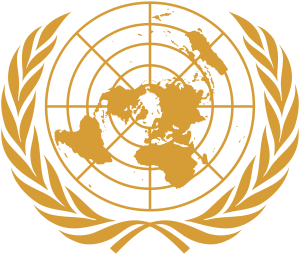United Nations General Assembly Second Committee
The United Nations General Assembly Second Committee (also known as the Economic and Financial Committee or ECOFIN or C2) is one of the six main committees of the United Nations General Assembly. It deals with global finance and economic matters.
 | |
| Abbreviation | ECOFIN, C2 |
|---|---|
| Legal status | Active |
| Headquarters | New York, United States |
Head | Chairperson Cheikh Niang |
Parent organization | United Nations General Assembly |
| Website | www.un.org/en/ga/second |
The Second Committee meets every year in early October and aims to finish its work by the end of November. All 193 member states of the UN can attend.
Mandate
The work of the Committee falls under eleven thematic clusters:[1]
- Macroeconomic policies
- Operational activities for development
- Financing for development
- Groups of countries in special situations
- Globalization and interdependence
- Eradication of poverty
- Sustainable development
- Information and communication technologies for development
- Agriculture development, food security and nutrition
- Human settlements and sustainable urban development
Current state
In its 73rd Session, the Committee will focus on:[2]
- Issues relating to economic growth and development
- Financing for development
- Sustainable development
- Human settlements
- Globalization and interdependence
- Eradication of poverty
- Operational activities for development
- Agriculture development, food security and nutrition
- Information and communications technologies for development
- Global partnerships
Reporting bodies
The Committee has five main bodies that report through it to the General Assembly. Two programmes: the United Nations Environment Programme and the United Nations Human Settlements Programme, as well as the governing bodies of the three Rio conventions: the Convention on Biological Diversity (CBD), the Convention to Combat Desertification (UNCCD) and the Framework Convention on Climate Change (UNFCCC).[1]
Working methods
The work of the Committee usually begins in early October and ends sometime by the end of November, though extensions are often granted to allow the Committee to continue its work until early to mid-December.[1] Its work is split into two main stages: (1) general debate and (2) action on individual items. The first stage, the general debate, lasts up to one week and begins with a keynote address by an invited speaker. The second stage last around four weeks, and is usually when negotiations on draft proposals are conducted.
The Committee also meets annually in a joint meeting with the Economic and Social Council.[1]
Bureau
The following make up the bureau of the Second Committee for the 74th Session of the General Assembly:[3][4]
| Name | Country | Position |
|---|---|---|
| H.E. Cheikh Niang | Chairperson | |
| Ahmad Saif Al-Kuwari | Vice-Chair | |
| Yuliana Angelova | Vice-Chair | |
| Anat Fisher-Tsin | Vice-Chair | |
| David Mulet | Rapporteur | |
See also
References
- The GA Handbook: A Practical Guide to the United Nations General Assembly (PDF) (2nd ed.). New York: Permanent Mission of Switzerland to the United Nations. 2017. ISBN 978-0-615-49660-3.
- "Economic and Financial Committee (Second Committee)". General Assembly of the United Nations. United Nations. n.d. Retrieved 29 November 2018.
- "Economic and Financial Committee (Second Committee): Bureau of the 74th Session". General Assembly of the United Nations. United Nations. n.d. Retrieved 1 October 2019.
- Manhire, Vanessa, ed. (2019). United Nations Handbook 2019–20 (PDF) (57th ed.). Wellington: Ministry of Foreign Affairs and Trade of New Zealand. ISSN 0110-1951.